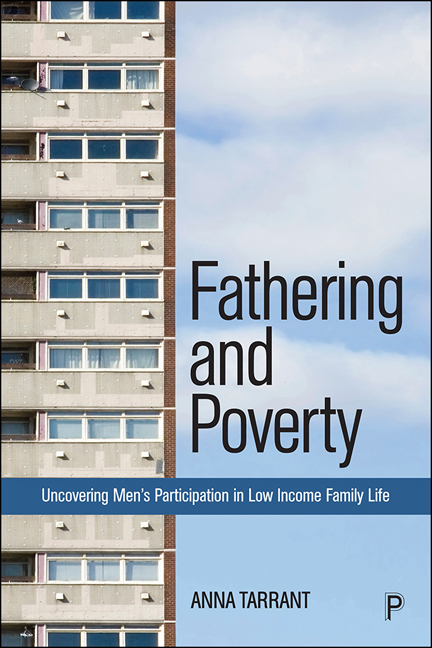Book contents
- Frontmatter
- Dedication
- Contents
- List of figures and tables
- List of abbreviations
- About the author
- Acknowledgements
- 1 Introduction: Fathering, poverty, families and policy
- 2 Low-income fatherhoods in historical and political context
- 3 Theorising men’s participation in low-income families
- 4 Supporting men in low-income contexts: practitioner observations
- 5 Men’s caring arrangements and family trajectories
- 6 Familial economic circumstances and provisioning practices
- 7 Men’s family participation in low-income urban neighbourhoods
- 8 Conclusion: Men’s family participation in low-income contexts
- Appendix A Participant information
- Appendix B ‘Existing evidence’ document shared at the knowledgeexchange workshop
- Notes
- References
- Index
7 - Men’s family participation in low-income urban neighbourhoods
Published online by Cambridge University Press: 30 April 2022
- Frontmatter
- Dedication
- Contents
- List of figures and tables
- List of abbreviations
- About the author
- Acknowledgements
- 1 Introduction: Fathering, poverty, families and policy
- 2 Low-income fatherhoods in historical and political context
- 3 Theorising men’s participation in low-income families
- 4 Supporting men in low-income contexts: practitioner observations
- 5 Men’s caring arrangements and family trajectories
- 6 Familial economic circumstances and provisioning practices
- 7 Men’s family participation in low-income urban neighbourhoods
- 8 Conclusion: Men’s family participation in low-income contexts
- Appendix A Participant information
- Appendix B ‘Existing evidence’ document shared at the knowledgeexchange workshop
- Notes
- References
- Index
Summary
This final empirical chapter focuses on the experiences of men residing in a low-income locality in the city where the MPLC study was conducted. It reports on the ethnographic methods employed at a community centre based in an area of deprivation in the city. The centre was described as an important site of care and connectedness by the professionals who supported recruitment of participants to the study (see Chapter 4) and this was also confirmed by the men themselves. Ethnographic approaches have proven to be an effective means for identifying, engaging with and foregrounding the voices of ostensibly ‘hard-to-reach’ populations, including low-income families (Hemmerman, 2010) and disadvantaged and economically deprived fathers (Wissö, 2018). Indeed, despite policy and public alarmism about the pervasiveness of ‘dad deprivation’ (Ashe, 2014) and ‘men deserts’ in low-income localities across Britain, the centre was a space where the presence of men was observed, including visibly as fathers.
In accessing some of the more marginalised men in the city it was possible to observe how and why being a father or carer remains an important identity for men even when access to children may have been compromised or lost. The limits to men's family lives and relationships are also considered via the lens of their local engagement, social networks and community participation. With a proactive agenda towards supporting community members with their mental health, the community centre therefore became a key site for uncovering the lived experiences of diverse fathering in low-income contexts. As Bonner-Thompson and McDowell (2020) note, care itself has become much more precarious under the conditions of austerity, yet it has also enabled new and alternative spaces and practices of care to emerge (Power and Hall, 2017). As a locality-based policy and practice intervention creating opportunities for collective participation, the community centre was a key exemplar of this in the study.
The findings presented are further illustrative of the deprivations of context that shape men's identities and trajectories. This space was especially valuable to the older men, for whom connections to family had become more tenuous over time and were more transitory. I argue that knowledge of the locality and community-based resources is integral to an understanding of this group of participants and for the development of a rich, multi-layered understanding of the contexts shaping men's family participation in low-income contexts over time.
- Type
- Chapter
- Information
- Fathering and PovertyUncovering Men's Participation in Low-Income Family Life, pp. 153 - 172Publisher: Bristol University PressPrint publication year: 2021



